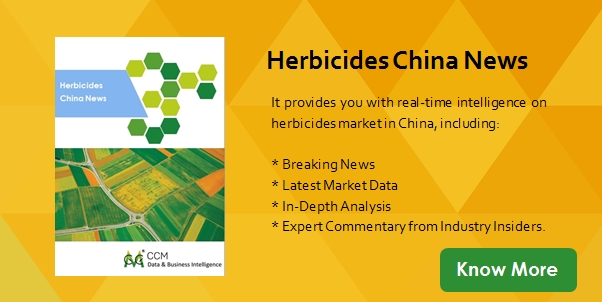Summary: In 2015, M&As happen
frequently among Chinese pesticide enterprises, becoming the hot issue for
industry insiders. It is predicted that supported by the governmental policy
and enterprises’ needs in development, M&As between pesticide enterprises
and even cross-industrial M&As will happen repeatedly in China.
Wang Jianwo, Secretary-General of Hunan
Pesticide Industry Association.
In order to strengthen the R&D ability,
achieve scale efficiency and synergy, increase market share, cut the management
cost and improve profitability, Chinese pesticide enterprises make M&As. In
2015, M&As happen frequently in China’s pesticide industry, drawing wide
attention from industry insiders. Both large-scale enterprises and medium- and
small-sized enterprises hope to achieve the business strategy planning through
M&A. At present, M&A of pesticide enterprises develop both in scope and
in depth.
There are four ways for M&A:
-
Asset-oriented transformation/ upgrading into high-profit business;
-
Business-oriented sale channel expansion;
-
Cost-oriented M&As;
-
Split after M&As.
It is expected that M&As amongst
pesticide enterprises and even cross-industrial M&As will happen frequently
in the future, based on the enterprise development strategies and supported by
government policies. Currently, the M&As in China’s pesticide industry have
developed towards resource intensive integration from ordinary M&As. This
is beneficial to the enterprises in resource integration, advantage
complementation and industry chain extension. Besides, it to some extent
enables enterprises to march into international pesticide market, improve added
value of products and achieve scale benefits. Experts pointed out that M&As
amongst Chinese pesticide enterprises present features as follows:
1. Strong complementarity in each side's
products, able to satisfy the demand from up- and down-stream industry chains;
2. Targets in M&As possess advantages
in R&D, technology innovation and market;
3. Listed enterprises (always subjects in
M&As) carry out acquisitions in different regions, in a move to grasp
market shares;
4. Small and disadvantaged enterprises are
easy to be swallowed up.
According to the latest news, Hunan Bohan
Biotechnology Co., Ltd., Hunan Chenzhou Tianlong Pesticide Chemical Co., Ltd.
and some enterprises are negotiating with potential partners on M&A based
on their self-development strategies.
On 14 May, 2015, Shandong Weifang Rainbow
Chemical Co., Ltd. (Weifang Rainbow) invested USD3.47 million (RMB21.26
million) to acquire 73% equity of Ningxia Gerui Fine Chemical Co., Ltd.
(Ningxia Gerui), subsidiary of Zhejiang Shenghua Biok Biology Co., Ltd.
(Shenghua Biok). Ningxia Gerui mainly engages in the production and sales of
PMIDA. However, due to insufficient market demand and poor product sales,
Ningxia Gerui continued suffering losses with overstocked products. After the
acquisition, Shenghua Biok no longer possesses equity of Ningxia Gerui. For
Weifang Rainbow, it can further expand production scale to create scale benefit
with the help of Ningxia Gerui’s advantages in resource and labor force.
Meantime, the acquisition can further enrich Weifang Rainbow’s product lines,
so as to rationalize the layout of its production bases. For Shenghua Biok,
transferring equity in Ningxia Gerui is conducive to optimizing the company’s assets
structure and improving the management benefit.
On 8 May, 2015, Zhejiang Yongtai Technology
Co., Ltd. (Zhejiang Yongtai) announced to acquire Shanghai E-tong Chemical Co.,
Ltd. (Shanghai E-tong)’s 100% equity with USD31.04 million (RMB190 million). It
is known that Zhejiang Yongtai hopes to perfect its whole production chain
(pesticide intermediate - technical - formulations) by acquiring Shanghai
E-tong. After that, Zhejiang Yongtai can develop the global pesticide
formulation business to enhance profitability relying on Shanghai E-tong’s
product registrations. As of now, Shanghai E-tong has submitted registration
materials of near 1,800 pesticides in over 60 countries overseas and has
obtained more than 500 registration certificates on pesticide.
On 7 April, 2015, Beijing Jinggeng Tianxia
Agricultural Science and Technology Co., Ltd. (Beijing Jinggeng Tianxia)
disclosed that it issued 3.8 million shares with USD3.73 million (RMB22.80
million) to Jiangsu Good Harvest-Weien Agrochemical Co., Ltd. (Jiangsu Good
Harvest-Weien). And the raised funds were mainly used for the construction of
Beijing Jinggeng Tianxia’s Langfang Production & Research Base and for the
liquidity supplement, so as to optimize its financial structure. Beijing
Jinggeng Tianxia stated that now the company meets the opportunity for its main
businesses development; and Jiangsu Good Harvest-Weien and Beijing Jinggeng
Tianxia complement each other in product structure and market distribution
channel, which can promote the fast development of its performance.
Both the acquisition and equity transfer
above are of great significance in speeding up processes of the pesticide
segment layout and industrial chain extension, optimizing product structure,
expanding sales scale, increasing profitability and enhancing core
competitiveness in the market for related enterprises.

About CCM:
CCM is the leading market intelligence
provider for China’s agriculture, chemicals, food & ingredients and life
science markets. Founded in 2001, CCM offers a range of data and content
solutions, from price and trade data to industry newsletters and customized
market research reports. Our clients include Monsanto, DuPont, Shell, Bayer,
and Syngenta. CCM is a brand of Kcomber Inc.
For more information about CCM, please
visit www.cnchemicals.com or get in
touch with us directly by emailing econtact@cnchemicals.com or calling +86-20-37616606.